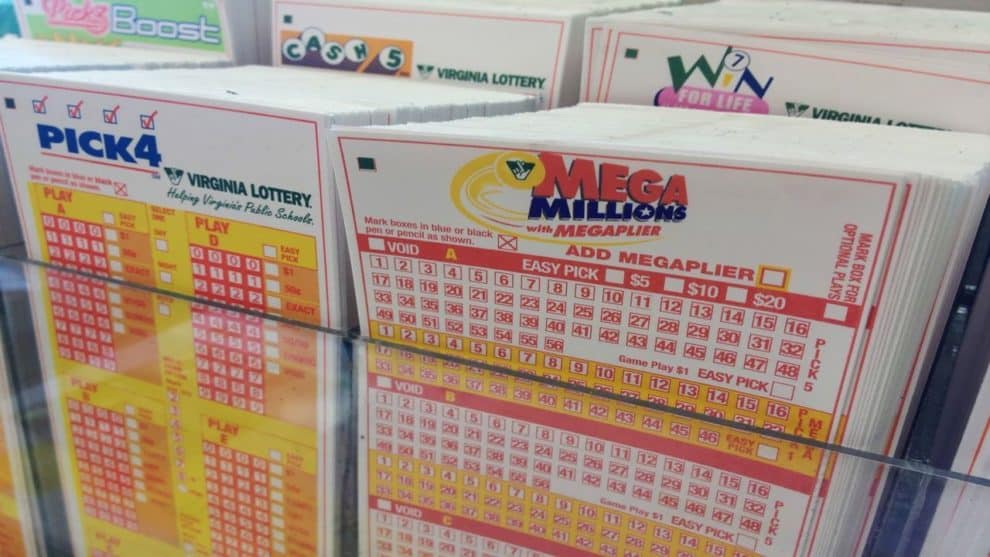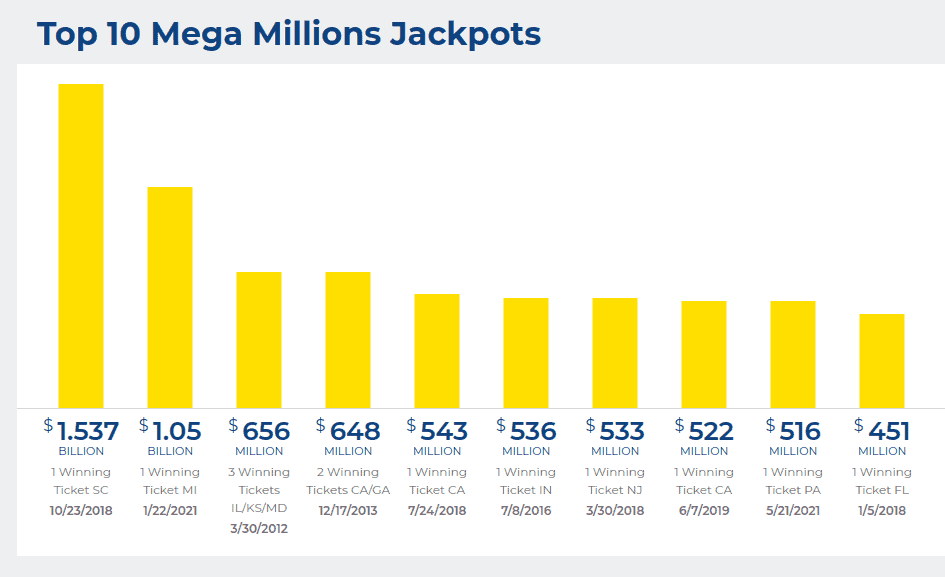
- The nationwide Mega Millions Lottery Jackpot will be an estimated $790 million for Tuesday’s drawing.
- Mega Millions games are available in 45 US states plus the District of Columbia and the U.S. Virgin Islands.
- The odds of winning the Mega Millions Jackpot are just over 1 in 302.5 million
There’s a big lottery jackpot building in the Mega Millions networked game and you know how excited that makes me. No winning tickets were sold for Friday night’s Mega Millions jackpot drawing so the big jackpot ($660 million USD) rolls over to an even bigger jackpot. The jackpot now stands at an estimated $790 million USD with the next drawing on Tuesday, July 26.
A helpful chart from the Mega Millions website shows us that Tuesday’s drawing will be for the third biggest jackpot in game history:

I have no problem with people playing the lottery, much in the same way that I have no problem with people intentionally sticking their hand on a lit oven burner. It’s not a good idea, but you can make your own decisions. My biggest issue with the lottery is how it is treated by the media and regulators relative to other forms of gambling. You never hear about ‘responsible gambling’ on the lottery, nor do you read cautionary tales of lottery degenerates in the media whenever ‘Powerball/Mega Millions fever’ starts to spread. This is in marked contrast to sports betting which has unfairly been linked with problem gambling and general degeneracy in every new market it enters. Obviously, there are some sports betting degenerates. From a demographic standpoint, however, sports betting enthusiasts are for the most part affluent college graduates. In other words, they’re people who can afford to spend some money for recreation.
Lottery players are a completely different demographic. The lowest fifth of the population in terms of economic status has the highest rate of lottery gambling (61%) and the highest number of days playing the lottery (26.1 days). There’s been an effort to explain the link between poverty and lottery play, but there’s obviously a myriad of factors at play. That notwithstanding, here’s some more about the lottery demographic:
The research literature in this area, however, often highlights the more problematic aspects of this phenomenon. A 2011 paper in the Journal of Gambling Studies conducts a thorough review of the available research on lotteries and concludes that the “poor are still the leading patron of the lottery and even the people who were made to feel poor buy lotteries. The legalization of gambling has seen a significant increase of young people gambling, particularly in lotteries, and the best predictor of their lottery gambling is their parents’ lottery participation.” A 2016 study in the same journal reports that more people have gambling problems in states with more types of legal gambling or where gambling has been legal for longer. A 2012 study from Yale University finds that the “receipt of scratch lottery tickets as gifts during childhood or adolescence was associated with risky/problematic gambling and with gambling-related attitudes, behaviors, and views suggesting greater gambling acceptability.” Moreover, other studies, such as a 2010 paper in the Journal of Community Psychology, find that lottery outlets are often clustered in neighborhoods with large numbers of minorities, who are at greatest risk for developing gambling addictions.
Some of this is fairly obvious and not unique to the lottery. The bit about states ‘with more types of legal gambling’ having a higher incidence of problem gambling is no surprise. Kind of like saying that states with more sharks have a higher incidence of shark bites. A substantially higher percentage of residents in my home state of Utah suffer broken limbs while skiing than they do in a state like Alabama.
The flip side of this–higher earners spend less on lottery tickets:
Presumably, higher earners found different venues to burn through cash. Households with incomes of $75,000 and above spent $105 a year on lottery tickets, a quarter of what low-income homes spent, the August survey of 1,000 Americans age 18 and older found.
The above linked article on CBS News tries to conflate buying lottery tickets with eating in restaurants or buying coffee. The big difference–Starbucks doesn’t try to sell an illusion of wealth with my daily cappuccino. Other media outlets give genius advice like this:
Jake Harris, the Michigan state lottery player relations manager, says to always put your money in if your coworkers or family are pooling together.
“My recommendation to people who have a lottery pool at work is to always put in the money because you don’t want to be the one left working in your group if it does happen to win and you didn’t pay for your ticket that week,” Harris said.
The jackpot for Friday night’s drawing has grown so large because there hasn’t been a winner in three months. Those 27 consecutive drawings without anyone matching all six numbers has allowed the jackpot to gradually grow from its $20 million starting point in April.
“The only guarantee with the lottery is that you can’t win if you don’t play. So you’ve got to take a chance to win,” Harris said.
To their credit, this article gave the odds against winning the Mega Millions jackpot (1 in 302.5 million) but then completely ignores it and prints a state lottery press release. The first quote is great–if your co-workers are playing the lottery, you should get your money in too since ‘if it does happen to win’ you don’t want to still be working. The explanation of why the jackpot is so high makes an effort to suggest that a winning ticket is ‘due’, ignoring the fact that no matter what the pot the odds are 1 in 302.5 million.
There’s no more vivid illustration of why so few people are able to make money gambling than the lottery. The math behind the lottery is simple. A fairly bright high school student could explain the long odds and point out the mistakes people make playing the lottery such as buying hundreds, if not thousands, of dollars worth of tickets hoping to win a jackpot. One of the more bizarre byproducts of the nonstop media hype surrounding the lottery is the appearance of ‘experts’ offering ‘lottery tips’ for ersatz jackpot winners. More often than not, these are former jackpot winners who by virtue of their good fortune are now treated like experts on math and probability. I have heard one–and only one–good piece of advice for playing these big money Mega Millions jackpots: use the computer generated ‘Quick Draw’ to pick your Mega Millions numbers. The logic here is sound since computers are better than humans at selecting truly ‘random numbers’.
Every other tip, ‘strategy’ and/or conventional wisdom you’ll hear from lottery players is wrong. Buying a whole bunch of tickets for a big jackpot is the classic one. You might increase your chances of winning but by so little that it doesn’t really matter. You have almost zero chance to win a Mega Millions jackpot. Buying another ticket doesn’t ‘double your chances’ since the product of multiplying ‘almost zero’ and ‘almost zero’ is still ‘almost zero’. Using the same set of numbers over and over again also doesn’t matter, nor does using your kid’s birthday or any other ‘lucky number’. A random number generator doesn’t care about any of that.
Next up, we’ll look at the odds of winning the Mega Millions jackpot in context.









